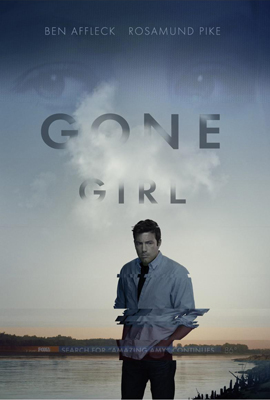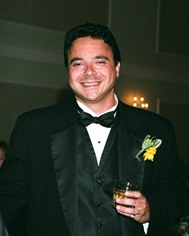
Having read and enjoyed the book, the film adaptation of “Gone Girl” keeps the story intact, largely due to the screenplay being written by its author Gillian Flynn. Yet while some of the more in-depth character motivations or “red herrings” presented as clues in Flynn’s whodunit of a woman’s disappearance on the morning of her fifth anniversary are given superficial treatment in this movie, these shortcomings can be overlooked thanks to the strength that lies in the hand of director David Fincher’s dark touch.
We’ve seen this dark touch before, and this is something Fincher does well. Whether delving into the mind of a psychopath or sociopath in films like “Se7en,” “Fight Club,” “Panic Room,” or even “The Social Network,” his sure directorial hand grips you in his depiction of our cold, ruthless nature. “Gone Girl” is no exception.
The story of “Gone Girl” begins with Nick Dunne (Ben Affleck) admiring his wife Amy (Rosamund Pike), wondering what she’s thinking. After arriving at work that morning, Nick receives a call from a concerned neighbor who says that Dunne’s front door is open, their cat is outside, and his wife doesn’t seem to be around. Nick returns home to see that his wife is indeed gone- the living room furniture is overturned and the glass coffee table top lies shattered on the floor. Seeing indications of a struggle, Nick calls the police. The investigating officers search the house; note blood-spatterings that appear in the course of their walkthrough, and stumble upon an envelope marked Clue One. Nick explains that this is Amy’s annual anniversary “treasure hunt” game, a puzzle that will eventually lead him to his anniversary present from her. Upon investigating the location described in Clue One, the police and Nick find not only the envelope for Clue Two, but a piece of lingerie not belonging to Amy.
Amy’s subsequent clues reveal more secrets about Nick and cause the police to believe he is responsible for his wife’s disappearance. Even Nick’s behavior and lack of knowledge concerning his wife begin to raise red flags. As the clues and secrets regarding Nick’s character are brought into the light, so is the darkness surrounding the events that have transpired behind the closed doors of the Dunne household. Did Nick murder his wife?
As with the book, the film “Gone Girl” is a story that is alternately told from Nick and Amy Dunne’s points-of-view: Nick through the police investigation; Amy through flashbacks introduced by entries into her diary. In the course of examining these viewpoints, the internal mysteries begin to unravel and add pieces to the jigsaw puzzle of what really happened to Amy. As more is revealed, the audience sees the bigger picture and the fun of “Gone Girl” is the dark picture that presents itself.
If I have any misgivings about the film, it’s that its cold and distant tone benefits Amy’s side of the story much more than Nick’s. Nick’s side has all the ear-marks of an “I gotta prove my innocence” track that someone like Harrison Ford pulled off so well in films like “Presumed Innocent” or “The Fugitive.” Yet in “Gone Girl,” Affleck downplays it closer to the style Cary Grant employed in his Hitchcock “man accused” film roles. While not bad, Affleck’s acting choice dampens the dynamic and is weakened in the overall balance against Amy’s stronger storyline, especially with Rosamund Pike as Amy. Pike does an excellent job and her performance and appearance fit Amy’s character well; the movie really shines when she’s on-screen.
Ultimately, this is Fincher’s movie. Apart from his sure-handed direction, the cold and distant atmosphere he creates not only serves the aloof, devious natures of the characters in “Gone Girl,” it also allows for touches of glib dark comedy in its portrait of a less-than-ideal marriage. It even manages to satirize the media attention and national curiosity generated by a suburban tragedy in America’s heartland. Fincher’s commentary on how innately depraved we are in relishing the sniffing of dirty laundry adds an interesting aspect to Flynn’s already intriguing story.
Even at a slightly overdrawn two-and-a-half hours, “Gone Girl” works. While it doesn’t have the gut-wrenching punch one might expect, Fincher delivers a pretty hard slap. His impression leaves a mark.
